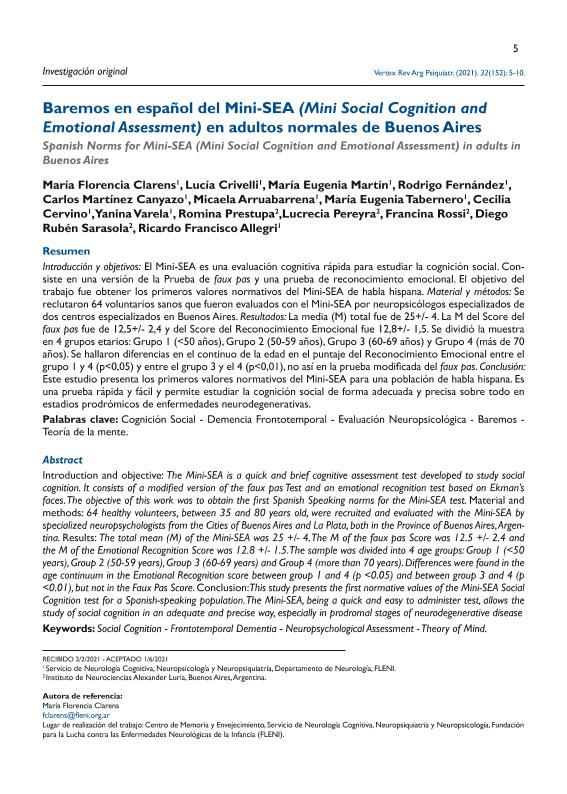Artículo
Introducción y objetivos: El Mini-SEA es una evaluación cognitiva rápida para estudiar la cognición social. Consiste en una versión de la Prueba de faux pas y una prueba de reconocimiento emocional. El objetivo deltrabajo fue obtener los primeros valores normativos del Mini-SEA de habla hispana. Material y métodos: Sereclutaron 64 voluntarios sanos que fueron evaluados con el Mini-SEA por neuropsicólogos especializados dedos centros especializados en Buenos Aires. Resultados: La media (M) total fue de 25+/- 4. La M del Score delfaux pas fue de 12,5+/- 2,4 y del Score del Reconocimiento Emocional fue 12,8+/- 1,5. Se dividió la muestraen 4 grupos etarios: Grupo 1 (<50 años), Grupo 2 (50-59 años), Grupo 3 (60-69 años) y Grupo 4 (más de 70años). Se hallaron diferencias en el continuo de la edad en el puntaje del Reconocimiento Emocional entre elgrupo 1 y 4 (p<0,05) y entre el grupo 3 y el 4 (p<0,01), no así en la prueba modificada del faux pas. Conclusión:Este estudio presenta los primeros valores normativos del Mini-SEA para una población de habla hispana. Esuna prueba rápida y fácil y permite estudiar la cognición social de forma adecuada y precisa sobre todo enestadios prodrómicos de enfermedades neurodegenerativas. Introduction and objective: The Mini-SEA is a quick and brief cognitive assessment test developed to study social cognition. It consists of a modified version of the faux pas Test and an emotional recognition test based on Ekman’s faces. The objective of this work was to obtain the first Spanish Speaking norms for the Mini-SEA test. Material and methods: 64 healthy volunteers, between 35 and 80 years old, were recruited and evaluated with the Mini-SEA by specialized neuropsychologists from the Cities of Buenos Aires and La Plata, both in the Province of Buenos Aires, Argentina. Results: The total mean (M) of the Mini-SEA was 25 +/- 4. The M of the faux pas Score was 12.5 +/- 2.4 and the M of the Emotional Recognition Score was 12.8 +/- 1.5. The sample was divided into 4 age groups: Group 1 (<50 years), Group 2 (50-59 years), Group 3 (60-69 years) and Group 4 (more than 70 years). Differences were found in the age continuum in the Emotional Recognition score between group 1 and 4 (p <0.05) and between group 3 and 4 (p <0.01), but not in the Faux Pas Score. Conclusion:This study presents the first normative values of the Mini-SEA Social Cognition test for a Spanish-speaking population. The Mini-SEA, being a quick and easy to administer test, allows the study of social cognition in an adequate and precise way, especially in prodromal stages of neurodegenerative disease.
Baremos en español del Mini-SEA (Mini Social Cognition and Emotional Assessment) en adultos normales de Buenos Aires
Título:
Spanish Norms for Mini-SEA (Mini Social Cognition and Emotional Assessment) in adults in Buenos Aires
Clarens, Maria Florencia; Crivelli, Lucía ; Martin, Maria Eugenia
; Martin, Maria Eugenia ; Fernández, Rodrigo Sebastián
; Fernández, Rodrigo Sebastián ; Canyazo, Carlos; Arruabarrena, Micaela; Tabernero, Maria Eugenia
; Canyazo, Carlos; Arruabarrena, Micaela; Tabernero, Maria Eugenia ; Cervino, Cecilia; Varela, Yanina; Prestupa, Romina Vanesa; Pereyra, Lucrecia; Rossi, Francina; Sarasola, Ruben; Allegri, Ricardo Francisco
; Cervino, Cecilia; Varela, Yanina; Prestupa, Romina Vanesa; Pereyra, Lucrecia; Rossi, Francina; Sarasola, Ruben; Allegri, Ricardo Francisco
 ; Martin, Maria Eugenia
; Martin, Maria Eugenia ; Fernández, Rodrigo Sebastián
; Fernández, Rodrigo Sebastián ; Canyazo, Carlos; Arruabarrena, Micaela; Tabernero, Maria Eugenia
; Canyazo, Carlos; Arruabarrena, Micaela; Tabernero, Maria Eugenia ; Cervino, Cecilia; Varela, Yanina; Prestupa, Romina Vanesa; Pereyra, Lucrecia; Rossi, Francina; Sarasola, Ruben; Allegri, Ricardo Francisco
; Cervino, Cecilia; Varela, Yanina; Prestupa, Romina Vanesa; Pereyra, Lucrecia; Rossi, Francina; Sarasola, Ruben; Allegri, Ricardo Francisco
Fecha de publicación:
07/2021
Editorial:
Polemos
Revista:
Vertex
ISSN:
0327-6139
e-ISSN:
2718-904X
Idioma:
Español
Tipo de recurso:
Artículo publicado
Clasificación temática:
Resumen
Archivos asociados
Licencia
Identificadores
Colecciones
Articulos(IFIBYNE)
Articulos de INST.DE FISIOL., BIOL.MOLECULAR Y NEUROCIENCIAS
Articulos de INST.DE FISIOL., BIOL.MOLECULAR Y NEUROCIENCIAS
Citación
Clarens, Maria Florencia; Crivelli, Lucía; Martin, Maria Eugenia; Fernández, Rodrigo Sebastián; Canyazo, Carlos; et al.; Baremos en español del Mini-SEA (Mini Social Cognition and Emotional Assessment) en adultos normales de Buenos Aires; Polemos; Vertex; 32; 152; 7-2021; 5-10
Compartir
Altmétricas



